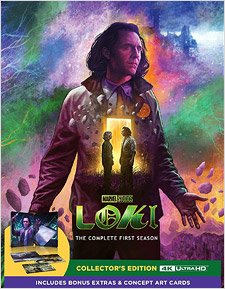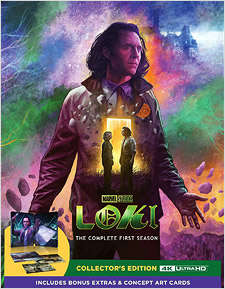Loki: The Complete First Season (Steelbook) (4K UHD Review)

Director
VariousRelease Date(s)
2021 (September 26, 2023)Studio(s)
Marvel Studios/Disney+ (Buena Vista Home Entertainment)- Film/Program Grade: B
- Video Grade: A
- Audio Grade: A-
- Extras Grade: B+
Review
Loki was the third of the canonical Marvel television series that the studio created for the Disney+ streaming service, and while in some respects it’s the most frivolous of the three, it’s still the most consequential overall. Frivolous, because it’s about Loki, who has long provided the some of the biggest comic relief in the Marvel Cinematic Universe. The show generally maintains a lighter tone than either WandaVision or The Falcon and the Winter Soldier did, and pairing Tom Hiddleston with Owen Wilson sets up comic expectations that Loki is only too happy to deliver. It also avoids most of the sober thematic elements of the previous shows; it doesn’t even try to address serious subjects like racism or the ways that people process grief. Loki is the God of Mischief after all, so his first solo effort is appropriately impish.
Yet that lighthearted tone doesn’t change the fact that the events of Loki have serious consequences. It isn’t a particularly substantial show in terms of character development—Loki is always gonna Loki, after all—and while it does explore the theme of self-acceptance, there’s not necessarily much in the way of real character growth. From a narrative standpoint, however, the show was far more momentous for the future of the MCU. The all-important comic book concept of multiverses had been teased in Thor and addressed a bit more openly in Avengers: Endgame and Spider-Man: Far From Home, but Loki provides a veritable primer on the subject. It proved to be a critical component to establish the next Phases of Kevin Feige’s fiendish master plan, and it also planted the seeds for the next big villain in the MCU, Kang the Conqueror (Jonathan Majors)—although Majors has proven to be as much of a liability as a strength since his debut in this show.
During one of the time travel sequences in Endgame, a past version of Loki escaped with the Tesseract, which created a variant version of himself and an alternate timeline, but the film promptly forgot about that fact and never really addressed it again. That may have been deliberate, however, in order to keep the focus on Endgame’s narrative while laying the groundwork for the future streaming series. Loki runs with the concept breathlessly, and as Loki’s adventures with the Time Variance Authority (TVA) progress, variant becomes variants, and doors aren’t merely opened but rather completely ripped off of their hinges. It all provides the building blocks for future installments in the MCU to use as their foundation.
Actors can understandably get weary of playing the same role over and over again, but if that’s true of Tom Hiddleston, he never shows it. More than a decade after first playing Loki in Thor, he still appears to relish each and every turn as the God of Mischief. He’s joined here by a memorable supporting cast including Wilson, Majors, Sofia Di Martino, Gugu Mbatha-Raw, and Richard E. Grant, most of whom attack their own roles with equal enthusiasm. (I mean, Richard E. Grant, for God’s sake. ‘Nuff said.) Hiddleston and Wilson go together like peanut butter and jelly, though it’s a little baffling why the show passed up the opportunity to have Hiddleston do his hilarious impersonation of Wilson. It’s not like it would have been tonally inconsistent with such an overtly comic show. (Maybe Marvel is saving that particular bit of mischief for Season 2.)
One of the criticisms leveled against Avengers: Infinity War was that there was no real sense of consequences to The Snap, since comic books can always just bring characters back from the dead. Yet that’s selling the genre short. In the world of comics, nothing is ever quite that simple, and no one can simply return without there being some repercussions as a result. Death and rebirth have their consequences, as Endgame demonstrated, and as Far From Home, WandaVision and The Falcon and the Winter Soldier also hinted. Loki dives into those consequences with both feet, and it broke open the MCU for a different kind of multilayered storytelling. Buckle your seatbelts, it’s been a bit of a bumpy ride so far, and it’s only going to get bumpier as the worlds of streaming and the cinema continue to collide.
Cinematographer Autumn Durald Arkapaw captured Loki digitally using Phantom Flex4K and Sony CineAlta Venice cameras with Panavision T-Series Lenses. Post-production work was completed as a 4K Digital Intermediate, with the bulk of the show framed at 2.39:1. (The TVA Orientation Video is windowboxed at 1.33:1, and for some reason there’s a single stray shot during the D.B. Cooper sequence in the first episode that’s inexplicably framed at 1.78:1.) While Loki is offered with Dolby Vision on Disney+, per Disney’s usual policy, High Dynamic Range has been confined to HDR10 on disc. Given the abundance of CGI, it’s not necessarily the sharpest or most detailed 4K presentation, but it’s a definite improvement over the streaming versions thanks to a more robust encode. Disney normally uses BD-66 discs, but in this case, the six episodes are spread out over two BD-100s, and everything benefits from the extra breathing room. The bitrate runs consistently higher than on most other Disney/Marvel 4K releases, and there aren’t any compression artifacts of note. While the HDR grade does seem to run a little dark at times, it springs to life during key moments to provide some dazzling highlights, especially as things come to a head over the last two episodes. Loki may be a streaming series, but it offers cinematic levels of quality in this 4K presentation.
Primary audio is offered in English Dolby Atmos. Loki is also available in Atmos on Disney+, but only in highly compressed Dolby Digital, and some viewers have issues getting Atmos to work properly on their streaming devices. Freed from the constraints of streaming, this uncompressed Atmos track really lets the sound design of Loki shine. It’s still mastered at a slightly low level—Loki is always gonna Loki, and Disney is always gonna Disney—but raising the volume restores the impact without compressing the dynamics. It’s an immersive mix with abundant use of the overhead channels, from subtle moments like the hatch closing over Loki’s head during his processing at the TVA, to potent ones like the destruction raining from the sky on Lamentis-1. There’s a decent quantity of deep bass, too. It’s not quite a reference quality track, but not only is it an improvement over the streaming version, but it’s also an improvement over many of Disney’s other MCU physical media releases. Additional audio options include French and Spanish 5.1 Dolby Digital. Subtitle options include English SDH, French, and Spanish.
Disney’s 4K Ultra HD Steelbook release of Loki is a two-disc set that includes a set of three different concept art cards. It’s not dual format, since Disney has opted to release the Blu-ray version separately, and it doesn’t offer any Digital Codes. (Presumably they’re withholding that option in order to protect the value of the show on Disney+.) The six episodes are spread across the two discs, with the extras split between them:
DISC ONE (EPISODES 1-3)
- Glorious Purpose (UHD – 50:22)
- The Variant (UHD – 53:15)
- Lamentis (UHD – 41:00)
- Designing the TVA (HD – 5:43)
- The Official TVA Orientation Video (HD – 1:46)
- Gag Reel (HD – 1:21)
- Deleted Scenes:
- Loki’s Coronation (HD – 2:34)
- The Standoff (HD – 2:24)
DISC TWO (EPISODES 4-6)
- The Nexus Event (UHD – 47:43)
- Journey into Mystery (UHD – 48:32)
- For All Time. Always. (UHD – 45:25)
- Assembled: The Making of Loki (HD – 63:01)
The extras on the first disc are all standard Marvel/Disney EPK fare, although the presence of a “clean” version of the TVA Orientation Video is welcome. Otherwise, Designing the TVA is a fluff piece about the production design for Loki, the Deleted Scenes don’t add anything essential, and the Gag Reel isn’t particularly amusing.
The meat and potatoes of the extras is on Disc Two. Assembled: The Making of Loki is a comprehensive look at the creation of the show, but it’s also an examination of Hiddleston’s history with the character. Hiddleston serves as narrator as well as in interview subject, and he starts by going back to his first appearance in Thor, while also offering some thoughts about Loki’s fate in Avengers: Endgame. From there, everything moves to the conception and production of Loki. There’s plenty of on-set and behind-the-scenes footage (including Hiddleston’s auditions from Thor), and even some Comic-Con footage from when he appeared in-character to promote The Avengers. The piece includes interviews with actors Hiddleston, Owen Wilson, Gugu Mbatha-Raw, Sofia Di Martino, Richard E. Grant, Jonathan Majors, Wunmi Mosaku, and Deobia Oparei. It also offers interviews with a diverse group of crew members including director Kate Herron, writer/producer Michael Waldron, costume designer Christine Wada, cinematographer Autumn Durald Arkapaw, production designer Kasra Farahani, and much more. It’s clear that everyone involved really believed in the show, and they all had great chemistry together—the on-set interviews with Hiddleston and Wilson are as amusing as you would hope they’d be.
The presence of a real making-of documentary like Assembled: The Making of Loki can’t help but feel like something of a mixed blessing. It’s a massive step up from the typical fluff pieces that most Marvel physical media releases include, but like the show, the only reason why it exists is because of Disney+, since it was originally offered as an extra on the streaming service. It’s a shame that Disney’s focus on streaming over physical media means that major MCU blockbusters get perfunctory extras while a show like Loki gets such a great documentary. Still, one should never look a gift horse in the mouth. After a couple of years of reserving all of the MCU streaming series to Disney+ only, this 4K Ultra HD release of Loki is a step in the right direction. It offers video and audio quality that’s a definite improvement over streaming, and the presence of extras with meat on their bones certainly doesn’t hurt. It’s not inexpensive, but Loki maintains a consistently high level of quality over its nearly five-hour running time, so it’s well worth a look.
- Stephen Bjork
(You can follow Stephen on social media at these links: Twitter and Facebook.)

